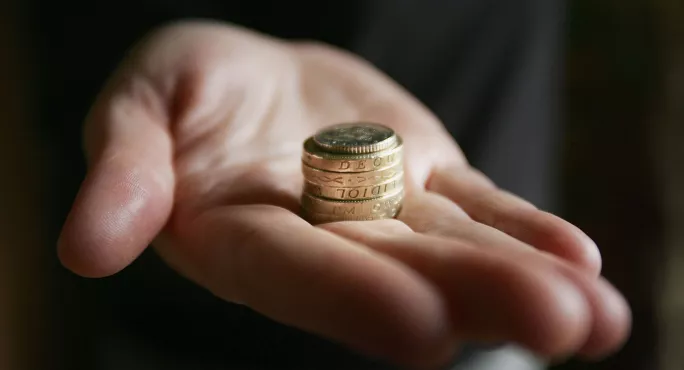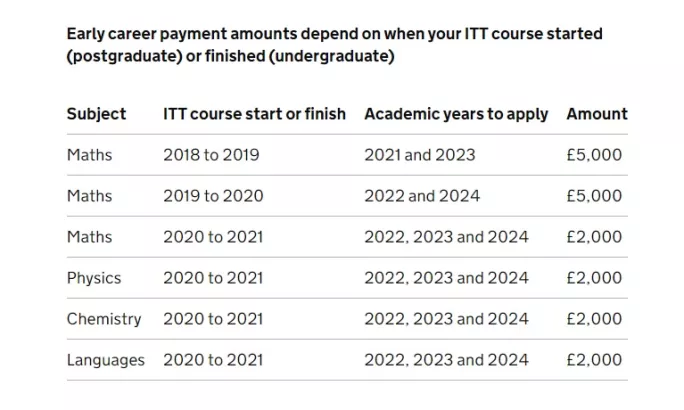Teacher pay: Uplift payments - who’s eligible and how to apply

Last year, the government said it would use the lure of extra cash to help attract and retain new teachers in subjects for which recruitment remains troublesome - dubbed early-career payments.
Furthermore, it said areas of the country where recruiting is especially hard would be prioritised with additional funding to help to, in prime minister Boris Johnson’s words, “send the best maths and science teachers to the places that need them most”.
This actually represented a U-turn of the policy that was being scrapped - something former government adviser and Tes columnist Sam Freedman said underlined the acknowledgement that recruitment in education had “gone off a cliff due to wider labour shortages” and needed tackling.
The locations for these new extra payments have now been confirmed by the government, meaning that as much as an extra £7,500 is available to some teachers - and £3,000 for the others. Here’s what teachers need to know about how to claim this extra cash.
Who is eligible?
In terms of the standard early-career payments, teachers of maths, physics, chemistry and languages are eligible for either a £5,000 or £2,000 payment depending on when they started their initial teacher training (ITT) course.
The table below shows the timeframes for eligibility by subjects, date and the amount on offer.

The government has specified that it classes an ITT course as a university-led and school-led course such as a postgraduate certificate in education (PGCE), School Direct ITT, school-centred ITT (SCITT), Teach First or a postgraduate teaching apprenticeship.
You must also have qualified teacher status (QTS) or qualified teacher learning and skills status (QTLS).
Meanwhile, undergraduate ITT includes a bachelor of arts (BA) degree with QTS or a bachelor of science (BSc) degree with QTS.
If you were awarded QTS through assessment only or overseas recognition in academic years 2018-19, 2019-20 or 2020-21, you will also be eligible.
Where do you have to work?
Any teacher in a state-funded school is able to apply - covering local authority-maintained secondary schools, academies and free schools or those within a multi-academy trust or special school, both local authority-maintained or non-maintained.
Part-time teachers can also apply and are eligible for the same amounts.
Supply teachers can also apply but you must be employed directly by the school and have been working for at least one term. Private agency supply teachers are not eligible, however.
Private school or sixth-form college teachers are also not able to apply.
Primary school teachers are also not eligible, as it is only focused on the specific secondary subjects as outlined above.
How long do you have to have been teaching?
Anyone wishing to apply must have started their induction if applying for a first payment, or completed induction if applying for subsequent payments.
Furthermore, you must have spent at least 50 per cent of your contracted hours allocated to teaching in one of the eligible subjects when you apply.
Where is the extra cash available?
If you meet all the above criteria, you can apply for the early-career payments.
However, if you are in one of the 39 local authority areas earmarked for levelling-up payments, you can boost the payments to £7,500 if previously eligible for £5,000, or £3,000 if previously eligible for £2,000.
The full list of locations in alphabetical order are:
- Barnsley
- Blackpool
- Bracknell Forest
- Bradford
- Coventry
- Derby
- Doncaster
- Dudley
- East Riding of Yorkshire
- Halton
- Isle of Wight
- Kingston Upon Hull, City of
- Kirklees
- Knowsley
- Leicester
- Liverpool
- Luton
- Middlesbrough
- Milton Keynes
- North Lincolnshire
- Northumberland
- Nottingham
- Oldham
- Peterborough
- Portsmouth
- Reading
- Rochdale
- Salford
- Sandwell
- Sefton
- Sheffield
- St Helens
- Stoke-on-Trent
- Swindon
- Tameside
- Telford and Wrekin
- Walsall
- Warrington
- Wolverhampton
How do you apply?
Applications for the extra cash must be made proactively and open in September of each academic year for five months.
You are able to register your interest for when the next application window opens here.
If you are also eligible to reclaim student loan repayments, this is not affected by applying for these early-career payments or the uplift amount.
Is it taxed?
Yes, the extra money is taxed - but the Department for Education (DfE) will pay the national insurance and income tax on the payment on the teacher’s behalf within the basic tax rate of 20 per cent on earnings between £12,571 to £50,270.
If the payment takes you over the threshold, into the higher rate of 40 per cent, then the teacher is liable to make the required national insurance and income tax contributions.
Any payments will include student loan repayments automatically.
You need a Tes subscription to read this article
Subscribe now to read this article and get other subscriber-only content:
- Unlimited access to all Tes magazine content
- Exclusive subscriber-only stories
- Award-winning email newsletters
Already a subscriber? Log in
You need a subscription to read this article
Subscribe now to read this article and get other subscriber-only content, including:
- Unlimited access to all Tes magazine content
- Exclusive subscriber-only stories
- Award-winning email newsletters
topics in this article



